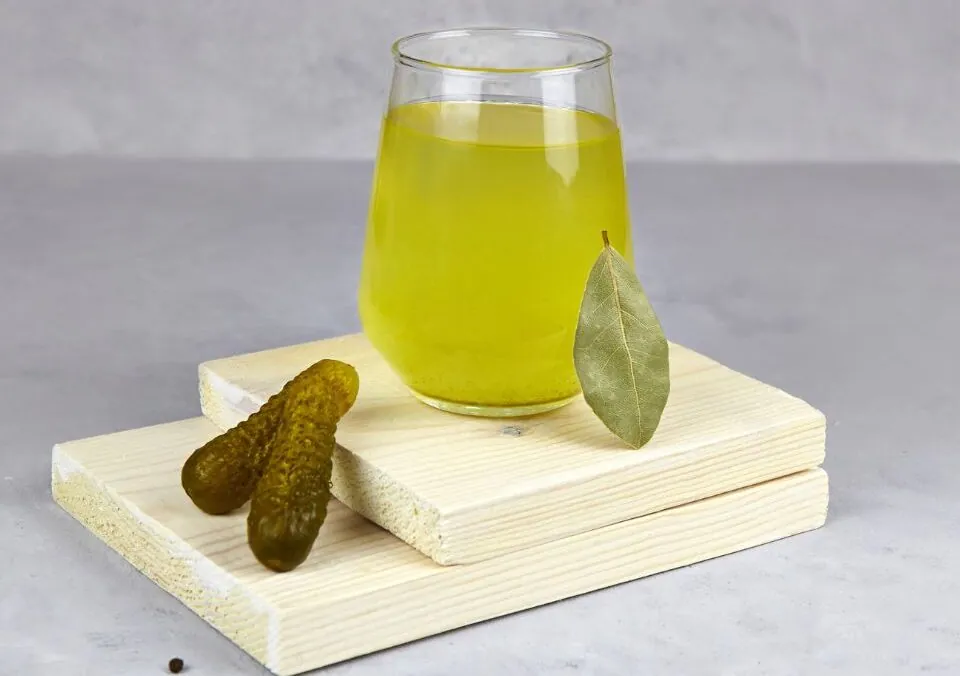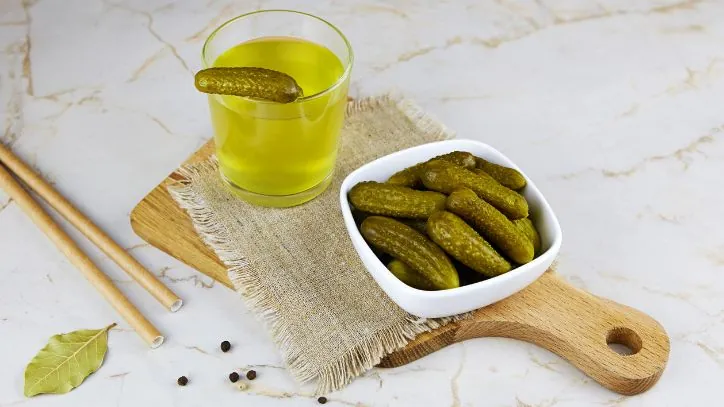Blog
Health Benefits of Pickle Juice

Pickles—they can be a divisive food. You either love their tangy crunch or despise their intense flavor. Personally, I fall into the “love” category. Whenever my family and I dine at a burger joint, I make it a point to order additional sides of pickles for enjoyment, and we always have a giant gallon jar of whole pickles stashed in our fridge. Until recently, I didn’t realize that the juice from these briny delights could be incredibly beneficial for our health.
The Probiotic Advantage
A key advantage of consuming pickle juice involves its potential as a source of gut-healthy probiotics. According to registered dietitian Matthew Black, certain pickles are fermented rather than simply soaked in a vinegar solution, making them a rich source of beneficial bacteria.
The Importance of Probiotics
Probiotics are live microorganisms that provide health benefits when consumed in adequate amounts. They contribute to a balanced gut microbiome, which plays a crucial role in digestion, absorption of nutrients, and overall immune function. Among other things, probiotics help fend off harmful bacteria, reducing the risk of gastrointestinal disorders.
Fermented foods, like certain types of pickles, can be a tasty way to incorporate probiotics into your diet. It’s crucial to look for pickles that label “fermented” on the jar, which usually indicates that live cultures are present in the juice.
Learn more about the importance of probiotics here. Source: Healthline
The Fermentation Process
Fermentation is a natural process that involves the breakdown of sugars by bacteria and yeasts. For pickles, this process often uses a brine solution of salt and water, allowing lactic acid bacteria to take center stage. As these bacteria consume sugars, they convert them into lactic acid, giving fermented pickles their characteristic tangy flavor and preserving them in the process.
Aside from pickles, many other foods can be fermented, including yogurt, kefir, kimchi, and sauerkraut. Incorporating a variety of these foods into your diet can help promote gut health.
Explore more about the fermentation process here. Source: Mayo Clinic

Pickle Juice and Muscle Cramps
Another significant health benefit of pickle juice lies in its ability to relieve muscle cramps. This is particularly useful for individuals engaged in sports or those who frequently partake in strenuous physical activities. Registered dietitian Matthew Black notes that pickle juice can inhibit the firing of alpha motor neurons, which are responsible for the contractions of muscles.
Understanding Muscle Cramps
Muscle cramps are involuntary contractions of a muscle or group of muscles and can be quite painful. They’re common among athletes but can also occur during any prolonged physical activity, such as gardening, walking, or climbing stairs. Factors contributing to muscle cramps can include dehydration, electrolyte imbalances, fatigue, and overexertion.
Learn more about muscle cramps here. Source: Mayo Clinic
How Pickle Juice Works
Pickle juice’s high sodium and electrolyte content can play a role in alleviating muscle cramps. When you’re sweating extensively, your body loses electrolytes, such as sodium, potassium, and magnesium. Replenishing these lost electrolytes can help maintain proper muscle function and prevent cramping.
Several studies support the idea that pickle juice can effectively relieve cramps. One study found that athletes who consumed pickle juice experienced cramp relief in about 85 seconds compared to those who drank water. While the scientific community continues to research the mechanisms behind this effect, the results are promising.
Read more about the studies on pickle juice and muscle cramps here. Source: Journal of Athletic Training
Hydration and Electrolyte Balance
Staying hydrated is essential for overall health, but it’s even more critical for athletes and active individuals. Pickle juice can be a practical option for restoring both hydration and electrolyte balance post-exercise.
The Role of Electrolytes
Electrolytes are minerals in your body that carry an electric charge, playing a vital role in various bodily functions. They help regulate nerve and muscle function, hydrate the body, balance blood acidity and pressure, and help rebuild damaged tissue. Common electrolytes include sodium, potassium, calcium, and magnesium.
When you sweat, you lose not only water but also essential electrolytes. If you don’t replenish these minerals, you may experience muscle cramps, fatigue, and other more severe health issues.
How Pickle Juice Helps
Drinking pickle juice after a workout can be an effective way to quickly replenish lost sodium and potassium. It provides a source of hydration while ensuring you get essential electrolytes back into your system.
Discover more about hydration and electrolytes here. Source: American Council on Exercise
Potential Drawbacks of Pickle Juice
While there are notable health benefits associated with pickle juice, it isn’t without its potential drawbacks. Consuming large quantities of pickle juice can lead to excessive sodium intake, which may pose risks for individuals with specific health conditions, such as hypertension or heart disease.
Sodium Considerations
Most traditional pickle juice is high in sodium due to the brining process. According to the American Heart Association, high sodium intake can contribute to high blood pressure, which increases the risk of heart disease and stroke. Therefore, moderation is vital when incorporating pickle juice into your diet.
If you’re considering using pickle juice for its health benefits, consult with a healthcare provider, particularly if you have any underlying health conditions or dietary restrictions.
Read more about sodium intake and health here. Source: American Heart Association
Managing Acid Reflux
Another consideration for those consuming pickle juice is the potential for acid reflux. The high acidity in pickle juice can aggravate individuals who suffer from gastroesophageal reflux disease (GERD) or other acid-related issues. If you experience heartburn or other symptoms, it may be beneficial to limit your intake or seek alternatives for hydration and gut health.
Learn about managing acid reflux here. Source: WebMD
Creative Ways to Use Pickle Juice
For those interested in reaping the benefits of pickle juice without simply drinking it straight, there are numerous creative ways to incorporate it into your meals and snacks.
Pickle Juice Marinades
Pickle juice can work wonders as a marinade for meats. Its acidity helps to tenderize the meat while infusing it with a delicious flavor. Chicken, pork, and even tofu can benefit from a few hours— or overnight— of soaking in pickle juice.
Salad Dressings and Dips
You can also use pickle juice in salad dressings or as a zesty addition to dips. Mix it with yogurt or sour cream to create a creamy dip for vegetables or chips. It adds a pleasant tang that elevates your favorite snacks.
Pickle-Brined Eggs
Pickle-brined eggs are a fun and tasty way to make hard-boiled eggs stand out. Simply submerge hard-boiled eggs in pickle juice and let them soak in the fridge for a few days. The eggs will take on a delightful tangy flavor perfect for snacks or salads.
Cocktails
Pickle juice has even made its way into cocktail culture. Many people enjoy using it as a unique addition to a Bloody Mary or as a briny splash in a dirty martini. The flavors can enhance your drink experience, adding an unexpected twist.
When to Avoid Pickle Juice
While there are numerous benefits to drinking pickle juice, it’s essential to be aware of when to avoid it. Individuals with a sensitivity to sodium or those advised by healthcare providers to limit sodium intake should be cautious.
Pregnant individuals should also consult with their healthcare provider regarding any dietary choices they make, including the consumption of pickle juice, due to its high sodium content and potential effects on blood pressure.
Learn about dietary considerations during pregnancy here. Source: Mayo Clinic
Conclusion
It’s intriguing to discover the potential health benefits hidden within the briny liquid of pickle juice. From providing gut-friendly probiotics to offering relief from muscle cramps, this beverage can be a noteworthy addition to your health routine. However, as with anything, moderation is key, especially considering the sodium content.
So next time you finish a jar of pickles, consider saving the juice! You might just find it beneficial for your gut health or a handy remedy for muscle soreness.
For more health-related topics and discussions, be sure to check out the Fill Your Plate blog!
By Heide Kennedy, Arizona Farm Bureau Communications Intern


















